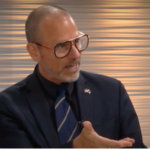Results from national polling company Gallup’s annual governance survey suggest a growing number of Americans believe government’s interference in their lives has grown too large.
Surveying randomly selected individuals from across the nation, researchers found 49 percent believe government is too active in their lives, and only 22 percent say government should play a larger role in everyday life.
Growing Sentiment
Over the past 12 years, Gallup polls have found a relatively steady increase in the number of people feeling the squeeze of government regulations. Excluding a two-year “rally effect” attributed by researchers to pro-government sentiments sparked by the 2001 terrorist attacks, more and more Americans have expressed that the government has intruded into too many aspects of their lives.
The proportion of citizens expressing government enacts the “right amount” of or “too little” regulation has trended downward. In 2005, 40 percent of Americans were comfortable with the scope of government interference in their lives, and 23 percent thought government should intervene more. This year the percentage of individuals holding those pro-regulatory sentiments reached near-record lows. Twenty-seven percent of those surveyed said government’s current size is sufficient, and 22 percent wanted government to seize more power.
“Americans are correct to be concerned about government regulation,” said Mark Thornton, a senior fellow at the Ludwig von Mises Institute. “It only kills jobs and raises costs and prices to consumers.”
Political Polarization
The survey also confirmed a growing divide between Republicans and Democrats, with 76 percent of the former indicating there is too much regulation, compared with only 22 percent of the latter.
Gallup’s analysis of its polling data suggests the overall increase of regulatory skepticism has been driven by a shift in Republicans’ views, as Democratic Party members’ support of government regulation has been largely consistent and dominant over the 13 years of surveys.
In the years during which Republican President George W. Bush held office, the majority of Republican Party members did not say government interference was a problem.
However, after President Barack Obama took office, a supermajority of Republican Party members quickly began to adopt a negative opinion of Big Government. Smaller-government sentiment in the Republican Party peaked in 2011, when 84 percent of Republicans said government had too much power.
Discussing the results, Gallup Editor in Chief Frank Newport wrote that “a number of Americans view the federal government negatively, and it’s likely that for many in this group, their negative perceptions of government regulation of business at least partially reflect their doubts that government’s getting more involved in such endeavors would produce positive outcomes.”
Concurring with Newport’s analysis, Competitive Enterprise Institute Vice President for Policy C. Wayne Crews said that “‘free markets’ and ‘laissez-faire’do not mean businesses get to run wild. The opposite is true. They are disciplined by their suppliers, their business customers, consumers, financial markets, the media, and rivals.”
From September 4 through September 7, Gallup researchers polled 1,017 randomly selected Americans aged 18 and older, using both landline and cellular telephones.
D. Brady Nelson ([email protected]) is an economist, writer, and speaker from Brisbane, Australia, Nelson is a regulation expert with The Heartland Institute.





